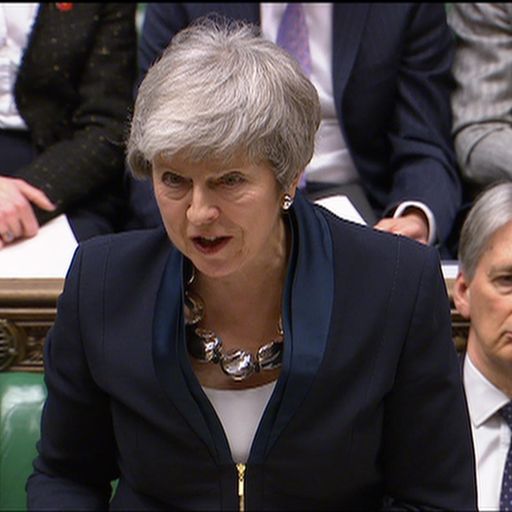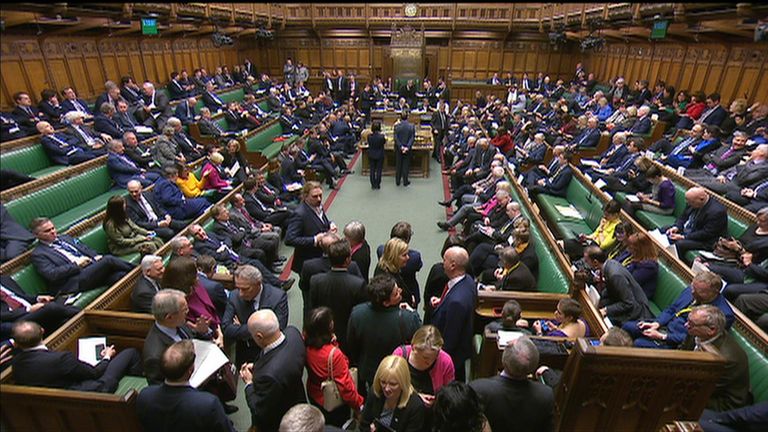Why the EU is likely to agree to an extension of Article 50
Emmanuel Macron and Angela Merkel seem to be indicating they would agree to give the UK more time as the EU also needs a solution.
Wednesday 27 February 2019 16:46, UK
Will the EU grant the UK more time for the Brexit process if Theresa May seeks an extension to Article 50? It's a key question.
Speaking side by side in the Elysee Palace, French President Emmanuel Macron and German Chancellor Angela Merkel seemed to say "yes", but in their own nuanced way.
"Regarding the Withdrawal Agreement, if the UK requires more time, we won't deny them that. But we are trying to come to an orderly solution to the UK's departure from the EU," Chancellor Merkel said.
"We regret this step, but that's the reality. And we need to find a good solution."
President Macron then said: "If Britain needs more time, we would support an extension request only if it was justified by a new choice of the British.
"But we would in no way accept an extension without a clear objective. As our chief negotiator Michel Barnier said: We don't need much more time, what we need now is decisions."
So one leader seems to be saying, in direct reference to discussions on the contentious withdrawal agreement, that if more time is needed, no problem.
And the other is saying an extension is only possible if justified "by a new choice by the UK people". A clear objective is needed, Mr Macron said.
So how should we understand all this?
My sense, based on conversations with senior officials in Brussels, is that an extension would be granted.
Mr Macron may say there will need to be clear reasons for extension, but judging the validity of these reasons is subjective and when it came to it, it's hard to imagine the EU saying "no" and thereby facilitating a no-deal rupture.
In the forefront of everyone's minds now is a simple fact: both sides need a deal; no-deal would impact both sides hugely because no one is really ready for the impact it would cause.
The no-deal bluff has run out of road for both sides (though no-deal by accident of UK parliamentary procedure remains a prospect, I think.)
The agreement to extend Article 50 requires unanimity from the 27 remaining member countries of the EU.
If Mrs May's deal is rejected by MPs, there'll be a vote on whether to extend Article 50, thereby delaying the UK exit.
Even if her deal passes, they'll almost certainly need to be an extension too - in order to pass the Withdrawal Agreement Bill (WAB) - legislation to formalise the divorce treaty.
On average, it takes two weeks, minimum, for a bill to pass through Commons & Lords in the process known as ping-pong.
In this case though the government would have just four parliamentary days to pass the bill as they can't fully bring it to Parliament until after EU summit on 21 March.
That's why it's generally accepted that even in the event that her deal passes the meaningful vote, on or before 12 March, a short "technical extension" will be needed.
If that were sought by Mrs May, there is zero prospect of the EU side saying no because it would have a clear objective - to ratify the deal.
There is a question over the agreed length of the technical extension. It's either late May (before the European elections polling day) or the start of July (the first sitting of the new European Parliament). This will be subject to some debate.
As for a longer extension? Well it would doubtless, and justifiably, come with conditions.
The UK would need to field MEPs in the European Elections - which would be highly contentious as you can be sure a long line of British Eurosceptic candidates would be ready to create mischief for the EU.
And crucially, as a continued member of the club, the UK would need to continue to pay into the EU budget.
So Mrs May is determined that her deal gets passed in the meaningful vote next week to rule out a long extension, and the possibility, as she sees it, of no Brexit.
The Attorney General, Geoffrey Cox, arrived in Brussels last night with his team of lawyers for further "technical talks" with the EU Brexit team.
The idea behind the talks is to secure some sort of legal guarantee in the form of a legally binding paper (perhaps just a few paragraphs) which allow Mr Cox to declare that his interpretation of the 'backstop' is that it doesn't, after all, tie UK to the EU in perpetuity.
Then, Mrs May and her team hope enough MPs will vote for her deal on or before 12 March in the meaningful vote.
How are those talks are going?
Well, the EU side says it will go "as far as possible" to offer legally binding guarantees that it doesn't want the backstop to be never-ending.
But no guarantees can end up contradicting the Withdrawal Agreement itself.
One EU source told me that as of the weekend "there is still a difference in what the UK hopes to get from the text and what the EU could live with".
But today, writing today in the Daily Mail, Theresa May says: "In the discussions I have had with the leadership of the EU... I've found a real determination to find a way through which allows the UK to leave with a deal. That engagement has already begun to bear fruit."
The prime minister's key concern is to demonstrate that her work to secure a better deal is still ongoing with Brussels.
UK officials are keen to stress - "we're nearly there".
In terms of how any legal reassurances are secured and presented: "We don't give a damn," says a source.
"A codicil or whatever…as long as we get the content right." [and it doesn't reopen/contradict Withdrawal Agreement].
So the negotiations to secure Mr Cox's codicil go on as the Brexit clock ticks down. But the prospect of an extension seem ever more likely.







